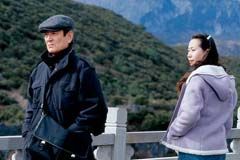RIDING ALONE FOR THOUSANDS OF MILES: Zhang Yimou in his Element
RIDING ALONE FOR THOUSANDS OF MILES
(drama)
Time: 93 mins
Rating: * * * 1/2
AFTER his foray into big-budget ‘wire-fu’ flicks, Zhang Yimou is back at what he does best — making low-key heart-warming social dramas. Zhang had followed the ‘International Road’ taken by director Ang Lee with Hero and The House Of Flying Daggers, stylish and lavish movies which were devoid of emotion and substance.
This time around, Zhang is on a project that is close to his heart – fulfilling a dream to work with his movie idol Takakura Ken. As a young student of the Beijing Film Academy, Zhang had been impressed by Takakura’s films. Riding Alone For Thousands Of Miles was written by Zhang with Takakura in mind and it is easy to see why.
Here, Takakura plays Gou-ichi Takata, a village fisherman who is summoned to Tokyo by his daughter-in-law Rie (Shinobu Terajima) because his son, Ken-ichi (Kiichi Nakai) is suffering from liver cancer. Father and son have not spoken in 10 years and Rie figures that this is a good time for a reconciliation. Ken-ichi, however, refuses to see his father and the old man is compelled to leave Tokyo with just a video-tape of his son’s work.
Ken-ichi has been doing research on Chinese folk dances and while watching the tape, Gou-ichi discovers that Ken-ichi has promised singer Li Jiamin (as himself) to return to Yunnan province to film his performance of a masked opera. Li had boasted that he is the best singer of the ditty, Riding Alone For Thousands of Miles (from the opera, Romance Of The Three Kingdoms) but he could not perform the song at that time because he had a cold.
Trying to make amends with his son, Gou-ichi travels thousands of miles to Yunnan to film Li’s song. This mission is not an easy one because Gou-ichi does not understand Chinese — and worse, he later discovers that Li is in jail. However, Gou-ichi’s dogged determination to film the singer helps to open his eyes (and ours) to his need to communicate with his loved ones, and to vent out his emotions openly.
A particularly touching sequence is when Gou-ichi is lost in the stone desert with Li’s illegitimate son, Yang-yang (Yang Zhenbo). Communicating only in sign language, he manages to ‘break the ice’ with the boy and even bond with him. Yes, this is the irony that pervades the movie — a man who has difficulty communicating with his countrymen and family must now find a way to communicate with a variety of people who cannot understand him.
Zhang also includes elements of comedy in this ‘problem’, especially with local tour guide Lingo (Qui Lin) who only speaks halting Japanese. Zhang could have opted for a ‘feel-good’ happy ending but he keeps the movie rooted in reality, making it a compelling tear-jerker. If you have enjoyed Not One Less and The Road Home, you will like this one too.

0 Comments:
Post a Comment
<< Home